.jpg)
Why AI-Optimized Content is the Future of Visibility for Private Equity Firms



What Is AI-Optimized Content for Private Equity Firms?
AI-optimized content for private equity firms is material designed to be understood, indexed, and surfaced by large language models (LLMs) such as ChatGPT, Claude, and Gemini. Unlike traditional SEO copy that chases keywords and rankings, AI-optimized content anticipates natural-language questions, provides clear and verifiable answers, and conveys a firm’s strategy, track record, and differentiators in a format AI systems can easily interpret. For private equity executives, this shift transforms content from a marginal marketing exercise into a strategic visibility asset.
Why Does AI-Optimized Content Matter Now?
For decades, SEO was largely irrelevant in private equity because sellers did not search for firms on Google and LP relationships formed offline. LLM adoption has changed that dynamic. Stakeholders—ranging from founders and registered investment advisors to family offices and intermediaries—are now asking AI tools direct questions about market players, sector focus, and founder-friendliness. If a firm has not published relevant, substantive content, it risks invisibility in AI-generated responses that increasingly influence decision-making.
How Do LLMs Change Content Discovery?
LLMs differ from search engines by delivering direct answers rather than lists of links. A founder might ask, “Which private equity firms specialize in RIA roll-ups?” or “Who has done deals in niche manufacturing?” If a firm’s website contains narrative, example-rich explanations that LLMs can parse, that content is more likely to be cited in the answer. This advantage extends beyond deal origination—AI-enabled discovery will also influence LP validation, banker recommendations, and competitive positioning.
What Content Formats Are Most Effective for LLM Visibility?
Content that is educational, narrative-driven, and free from excessive marketing language performs best for LLM comprehension. Case studies, founder stories, sector overviews, and transparent explanations of investment philosophy are high-value formats. These pieces should demonstrate how the firm operates, the types of companies it partners with, and the results achieved. Unlike time-sensitive market commentary, evergreen narratives maintain relevance, ensuring that LLMs continue to surface them long after publication.
How Should Private Equity Firms Balance Specificity and Discretion?
The most credible AI-optimized content avoids vague generalities and focuses on tangible details. Instead of simply claiming to be “founder-friendly,” firms should illustrate that claim with actual portfolio experiences, leadership testimonials, or concrete deal structures—while omitting sensitive financial or competitive intelligence. Specificity builds trust with both human and AI evaluators, helping to differentiate the firm from competitors who rely on broad, interchangeable statements.
Why Is AI Content Readiness a Strategic Investment?
Even if immediate AI mentions seem optional, developing AI-optimized content builds long-term marketing resilience. Firms that invest now create a foundational narrative they can scale quickly when market conditions shift, whether due to changes in LP composition, competitive deal processes, or public exposure. As with the pivot to digital presence during the COVID-19 pandemic, those with a pre-existing content infrastructure will adapt faster and with greater credibility than those starting from zero.
How Can Firms Begin Creating AI-Optimized Content?
Private equity firms do not need to become media companies to succeed. The starting point is publishing one or two well-crafted pieces per year that clearly state what the firm does, who it serves, and how it operates. Authenticity matters more than volume or polish. By building this baseline and maintaining consistency, firms ensure that LLMs can associate their name with specific capabilities, sectors, and cultural attributes—strengthening visibility and influence in the evolving digital diligence process.
Read More
Infrastructure investing has always been a relationship-driven category, yet digital presence now shapes first impressions in ways that were not true even five years ago. LPs conduct more pre‑meeting research online; management teams often review a firm’s website before returning a call; and advisors form early opinions based on design, hierarchy, and clarity.
For infrastructure managers, the challenge is distinct. Many strategies span complex asset classes, diverse subsectors, and multidecade horizons. There is a natural impulse to explain everything at once. This often leads to dense pages, unclear prioritization, and inconsistent messaging.
This post outlines what infrastructure firms should emphasize first, why those elements matter, and how to structure a homepage that provides clarity within the first ten seconds of exposure.
Start With the Three Things Visitors Want to Know Immediately
Across our work with transportation, energy, utilities, digital infrastructure, and real asset managers, site analytics reveal a consistent pattern. New visitors quickly scan for answers to three questions:
- What do you focus on?
(Strategy, sectors, geography, asset types) - How experienced are you?
(Team, track record, heritage, reputation) - Why should I trust you with this category?
(Credibility signals, clarity, specialization)
The homepage should address these questions directly. Many firms begin instead with long narratives, rotating banners, or abstract mission statements. Those elements are fine later in the story, although they rarely provide the orientation visitors need early in the interaction.
Lead With Strategic Focus Before Scale
Infrastructure firms often position themselves by describing the scale of the market or the breadth of their capabilities. This approach sometimes creates the perception of generalism. A clearer pathway is to establish strategic focus early, followed by the ways the firm executes within that focus.
A simple structure works well here:
- Category: transportation, digital infrastructure, renewable energy, etc.
- Approach: credit, equity, hybrid, value-added, core-plus
- Mandate characteristics: geography, deal profile, subsector considerations
- Investment posture: long-term ownership, operational engagement, risk orientation
The goal is not to overwhelm, but to clarify. Visitors should understand at a glance where the firm plays.
Show Visual Proof of Scale Early
Infrastructure is a tangible category, which means the homepage benefits from tangible cues. Photography of ports, rail yards, terminals, data centers, logistics facilities, or similar assets quickly conveys scale and seriousness. These images serve a functional purpose: they reinforce that the firm operates in capital-intensive, real-asset environments.
A table summarizing effective visual elements helps guide discussions:
Visual cues often communicate what text cannot convey quickly.
Sequence Information Based on Visitor Intent
Homepage content should follow a predictable information hierarchy. The structure below works well for most infrastructure managers and feels natural for a variety of audiences.
1. Strategy Overview
A concise articulation of what the firm does.
2. Sector or Asset Focus
A high-level summary of the areas where the firm has depth.
3. Track Record or Experience Cues
Curated examples of transactions, partnerships, or representative assets.
4. Team Introduction
Photos, roles, or a link to the full team page.
5. Approach or Philosophy
Brief statements describing how the firm works with management teams, investors, and operating partners.
6. Optional: Thought Leadership or Insights
Only if the firm has content that reinforces expertise.
This sequence prioritizes clarity. Visitors can explore deeper pages as needed, but the homepage should function as a structured overview.
Consider a Single-Scroll Homepage for Emerging Firms
For newer infrastructure managers, a single-scroll homepage often provides the right balance of clarity and flexibility. It allows the firm to present a cohesive snapshot without requiring extensive subpages that may not yet have sufficient content.
A single-scroll page typically includes:
- A headline and short strategic descriptor
- A brief overview of specialization
- Representative visuals
- A small set of curated proof points
- A concise team introduction
- A clear call to engage or learn more
This approach helps early-career managers look polished from day one while reserving room for future expansion.
Closing Thought
Infrastructure investors and management teams operate in environments that reward precision. They expect the same from the firms they consider partnering with. A homepage that is concise, visually disciplined, and logically structured communicates those qualities immediately.
The most successful infrastructure websites follow a simple principle: provide enough clarity for the visitor to understand the firm’s identity and relevance, while leaving room for deeper exploration on internal pages.
When that balance is achieved, the digital presence reinforces the firm’s strategy rather than competing with it.
Sector specialization has become one of the clearest differentiators in private markets. Investors value managers who understand the nuances of a specific industry, the operating realities behind the numbers, and the long-term drivers that shape performance. Transportation and infrastructure firms are often especially strong here, because the category is too complex to approach as a generalist.
Specialization, however, brings a communication challenge. LPs want depth, but they also want reassurance that a firm’s opportunity set is sufficient, that the strategy is not overly concentrated, and that the specialization is intentional rather than limiting. When firms do not control the narrative, specialization can appear narrow rather than focused.
In Darien Group's work across infrastructure mandates, the most effective firms are those who position specialization as a strategic advantage that expands opportunity rather than constrains it. This post outlines a framework for communicating specialization with precision and balance.
Why Specialization Requires Careful Messaging in Infrastructure
Transportation and infrastructure are broad ecosystems. Ports, terminals, logistics networks, rail operations, intermodal facilities, maritime services, road transport, and aviation each behave differently and operate under distinct regulatory, labor, and economic conditions. Within this diversity, a specialized investor can build meaningful advantages.
Some LPs, however, perceive specialization as concentration risk, if it is not explained clearly. Many firms respond to this by listing every adjacent subsector, which dilutes the message and creates confusion.
A stronger approach is to communicate specialization as a deliberate choice that enhances performance, access, and insight. A managing partner in a recent discovery interview described it this way:
“Transportation is big and small at the same time. You can focus deeply without ever running out of opportunity.”
That framing gives specialization scale. The narrative should support it.
Use a Flywheel to Show How Specialization Works in Practice
Specialization gains credibility when it is presented as a system rather than a label. One structure we often use is a flywheel that illustrates how expertise compiles over time.
The Specialization Flywheel
Each component reinforces the others. When presented clearly on a website or in a pitchbook, the flywheel helps audiences understand that specialization is dynamic and expansive, not limiting.
Explain the Strategic Rationale Behind Specialization
Investors often respond well to clarity of purpose. Firms that articulate why they specialize tend to avoid concerns about concentration. Examples include:
- Information advantage: Understanding industry benchmarks, cost structures, and regulatory environments.
- Operational insight: Recognizing early the indicators of performance, safety quality, or management capability.
- Opportunity quality: Receiving inbound deal flow from operators who prefer partners with industry fluency.
- Underwriting discipline: Evaluating risk and value through a consistent set of sector-informed criteria.
These reasons are concrete and measurable, which helps maintain credibility.
Position Specialization as Scalable
Specialized firms sometimes hesitate to speak too narrowly about their focus, fearing they will appear constrained or overly technical. A better approach is to demonstrate how specialization expands outward in logical, adjacent ways.
Three methods work particularly well:
1. Show adjacency
Explain how expertise in one area naturally connects to others.
2. Show deal volume across sub-verticals
This demonstrates opportunity size without overstating breadth.
3. Show market size and demand drivers
Macro trends such as supply chain modernization, onshoring, and freight demand growth help contextualize scale.
These moves reassure LPs that the firm’s specialization is both strategic and sufficiently expansive.
Closing Thought
A clear specialization narrative supports investment committees, differentiates the firm from generalists, and strengthens trust with management teams who value partners who “speak their language.” It also helps the firm maintain internal coherence, because the brand aligns with the actual strategy.
The goal is not to appear broad. The goal is to make the depth of expertise visible, legible, and strategically grounded.
When specialization is presented as a system, not a constraint, it becomes one of the firm’s most durable advantages.
Investment banks have one of the most unusual digital challenges in professional services. They are high‑trust, high‑stakes advisors operating in a category where almost every firm sounds the same. Yet when we review websites across the industry, the gap isn’t just in the language. It’s in the structure.
Many banks simply don’t give visitors the pages, pathways, or hierarchy they need to understand the firm quickly. In an environment where founders, sponsors, and strategic buyers often form first impressions digitally, website architecture needs to do as much work as messaging.
This post breaks down the foundational pages every investment bank needs, regardless of size, sector, or specialization.
Why Website Structure Matters More for Investment Banks Than Most Realize
Investment banking is a category defined by information asymmetry. Prospective clients want to know:
- Does this firm understand my sector?
- Do they have the team depth to run my process?
- What outcomes have they delivered?
- How do they actually work with clients?
However, they rarely ask these questions explicitly. They infer the answers by how the site is built.
From our work with investment banks, four patterns consistently emerge:
- Founders want reassurance the firm has handled situations like theirs.
- Sponsors want proof of repeatability and specialization.
- Management teams want to see the people behind the pitch.
- Buyers want confidence in clarity and professionalism.
The right set of pages addresses all four.
The Five Essential Pages Every Investment Bank Needs
1. About Page: The Anchor of Credibility
The About page is usually the second-most-visited page on any bank’s site and often risks being too brief, too broad, or too generic.
A strong About page should clearly address:
- What the firm believes (values, orientation, and approach)
- How the firm works (philosophy, engagement model)
- Why the firm wins (sector focus, execution track record, differentiation)
- What clients can expect (senior attention, process architecture, communication style)
2. Industry Verticals: The Proof of Specialization
Specialization is one of the strongest differentiators in today’s mid-market M&A landscape. But many banks bury their sector expertise or present it as a simple list.
A robust verticals structure should:
- Offer individual pages or sections for each sector
- Highlight patterns of expertise (recurring themes, value drivers, buyer ecosystems)
- Include representative tombstones or case summaries
- Translate expertise into practical insight (“Here’s how deals in this industry behave”)
A simple but powerful table often helps:
Take a look at middle-market investment bank, BlackArch Partner's website. The firm's "Expertise" page features both a high-level snapshot of their industry groups as well as clickable full pages for each sector. The internal pages feature market perspective, key subsectors, selected transactions and case studies, and a call to action to contact the dedicated sector team.
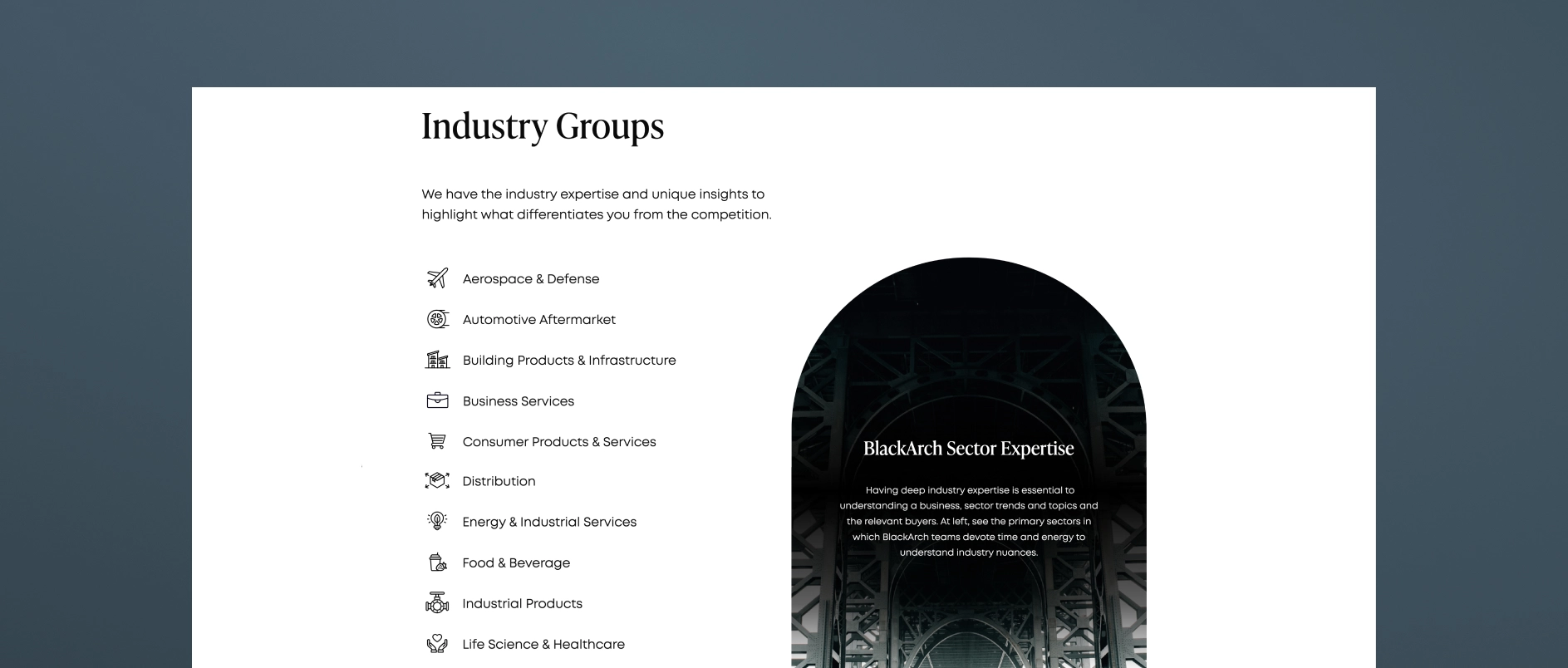
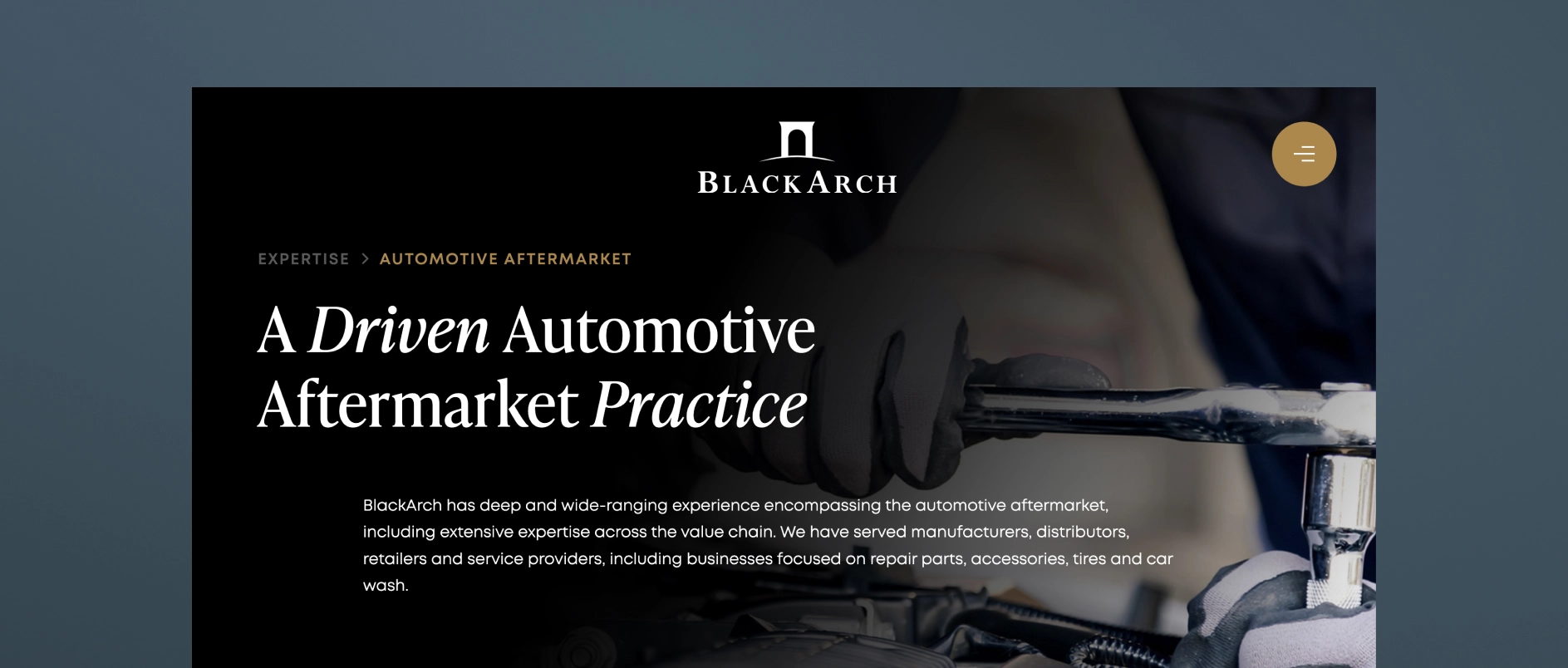
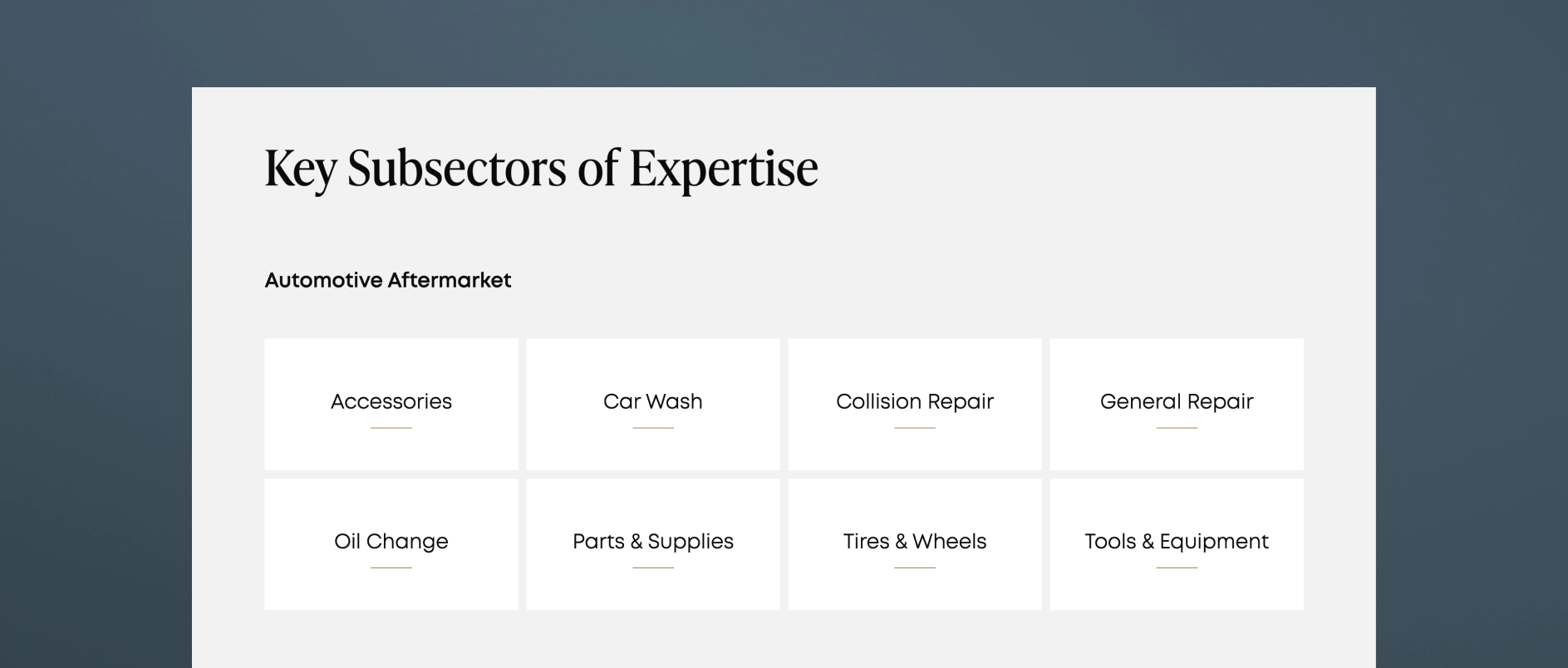
3. Transaction Experience: More Than a Tombstone Wall
Tombstones are a core part of banking history, but a grid of logos isn't enough to tell a meaningful story.
A strong transaction experience section does three things:
- Shows breadth and repeatability across sectors and transaction types
- Allows filtering (by sector, deal type, or year) to help visitors find relevance
- Incorporates case narratives to show how the firm thinks, not just what it has closed
The difference in perception between tombstones alone and tombstones paired with narratives is dramatic. The latter transforms activity into competence.
BlackArch Partners takes an intentional approach here as well. Clean filtering, search capabilities, and buildout of select transactions into full case studies.
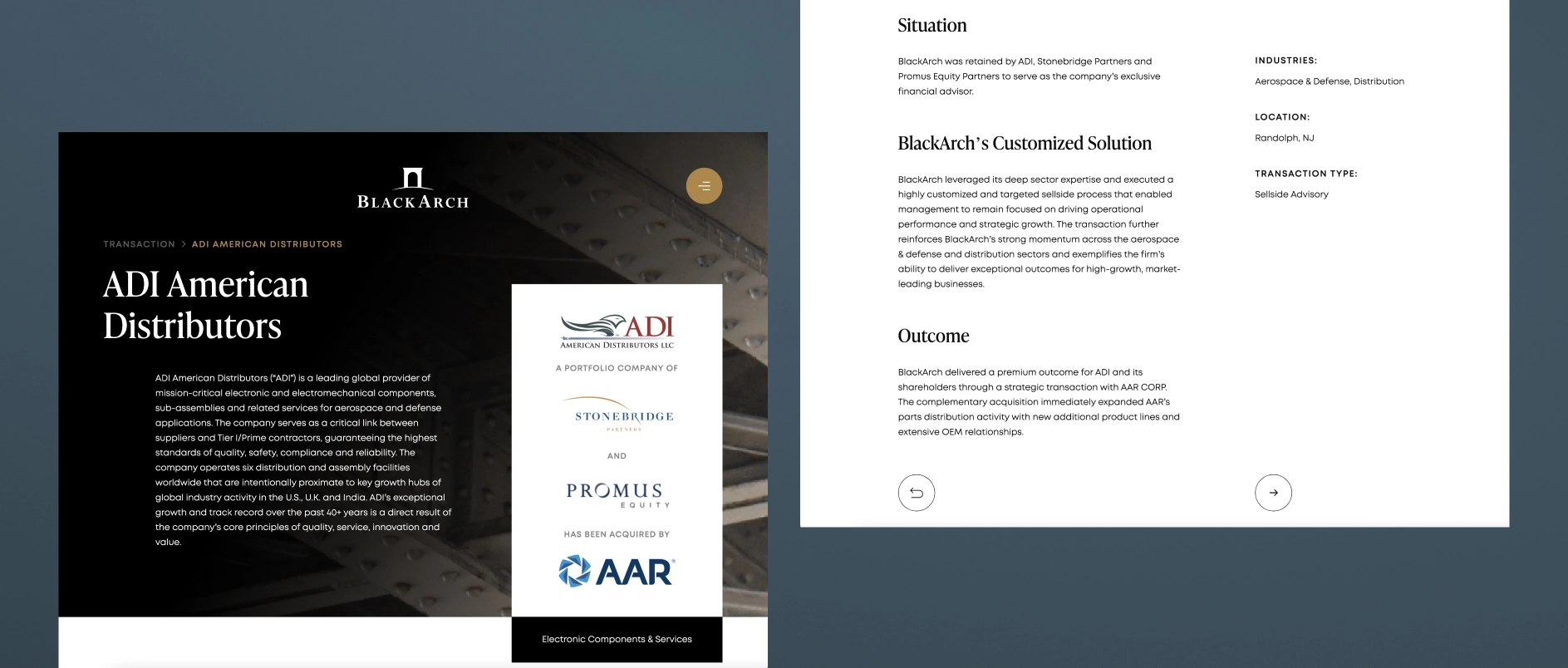
4. Team Page: The Most Underestimated Source of Trust
Banking is relationship-driven. People make the decisions, run the processes, and drive the outcomes. Yet the industry’s team pages are often generic and inconsistent.
High-performing team pages include:
- Professional photography (aligned, modern, consistent)
- Clear bios with sector focus, transaction experience, and relevant history
- Logical grouping (leadership, bankers, operating specialists, advisory roles)
- Signals of stability including tenure, growth, continuity
Founders and sponsors profile teams the same way investors profile GP teams: they look for cohesion and credibility.
5. How We Work: The Page Most Banks Don’t Realize They Need
This page, sometimes called Process, Philosophy, or Approach, is the one that transforms a site from informative to persuasive. It answers a simple but critical question:
“What is it like to run a process with you?”
A strong How We Work page includes:
- Process pillars (e.g., preparation, positioning, outreach, negotiation)
- What differentiates the firm’s execution
- How the team collaborates internally
- How they communicate with clients
This page is invaluable to founder-led businesses, who often lack context for how M&A processes unfold. It builds comfort early, which increases conversion.
The Optional Sixth Page That Increasingly Matters: Insights
Middle-market investment banks don't need a fulsome content engine, but two to four thought pieces per year can:
- demonstrate sector authority
- support SEO
- reinforce specialization
- give bankers content to use in outreach
- shape early impressions for founders and sponsors
This page is optional, but for many firms, increasingly strategic.
Closing Thought
The power of these five (or six) pages isn’t in any one page individually. It’s in how they form a structured, intuitive story:
- Who you are
- What you specialize in
- What you’ve accomplished
- Who’s doing the work
- How you work
When investment banks build their sites around these pillars, perception shifts. The firm feels:
- clearer
- larger
- more sophisticated
- more intentional
- more trustworthy
In the middle market, many of the smaller investment banks consistently outperform expectations. They win competitive mandates, generate standout outcomes, and deliver senior‑level attention. Yet when we evaluate their digital presence, a surprising pattern emerges: the website often communicates far less scale, sophistication, and capability than the firm actually possesses.
This is not because these teams lack accomplishments. It’s because the mid-market has historically underinvested in digital storytelling. Relationships, reputation, and repeat sponsors carried the brand, but in today’s environment — where founders vet advisors online before taking a meeting, sponsors compare websites when deciding which banker to refer, and junior talent evaluates firms based on digital signals — the website has become a primary proxy for credibility.
The Perception Gap: When Outcomes Say One Thing, but the Website Says Another
Small and mid-sized investment banks tend to have three advantages that larger platforms may struggle with:
- Senior attention and consistency
- Deep specialization in chosen sectors
- Faster, tighter execution with fewer handoffs
But these strengths rarely surface in the digital experience. Instead, many sites rely on:
- a dated visual system,
- an overloaded tombstone grid,
- generic sector descriptions,
- minimal team visibility,
- and undifferentiated claims about “full-service M&A advisory.”
This creates a perception gap between who they are and who they appear to be online.
To close that gap, firms need a digital presence that communicates scale, precision, and institutional polish, even if the firm is intentionally lean.
Digital Signals That Convey Scale (Without Pretending to Be Bigger Than You Are)
The goal isn’t to masquerade as a bulge-bracket bank. It’s to communicate capability in a way that reflects the quality of the actual work.
Below are the digital cues that consistently make mid-sized firms feel larger, more established, and more institutionally credible.
1. Visual Restraint and Modern Aesthetics
Investment banks tend to default to dense pages, long paragraphs, and dated corporate templates. But restraint reads as confidence. Clean whitespace, modern typography, and disciplined color palettes immediately reposition a firm as more sophisticated.
2. Thoughtful Tombstone Presentation
Most banks simply stack transactions into a grid. High-performing firms categorize, filter, or sequence tombstones in ways that tell a more strategic story — by industry vertical, transaction type, or recurring sponsor relationships.
3. Clear Specialization Narrative
The best mid-market firms win because they are sector experts. The site needs to show, not just say, what those sectors are, how deep the expertise runs, and how the firm’s insight drives execution quality.
4. Robust Team Identity
Lean teams are a feature, not a bug. Senior attention is a differentiator. High-quality photography, thoughtful bios, and clear roles communicate stability and hands-on execution.
5. Process Transparency
Founders and sponsors often care as much about how the firm works as what the outcome history is. Even a simple three-step “process philosophy” can dramatically increase perceived institutional maturity.
Take at look at the BlackArch Partners website. This website is a great example of ticking all of the boxes above and truly standing out from the crowd.
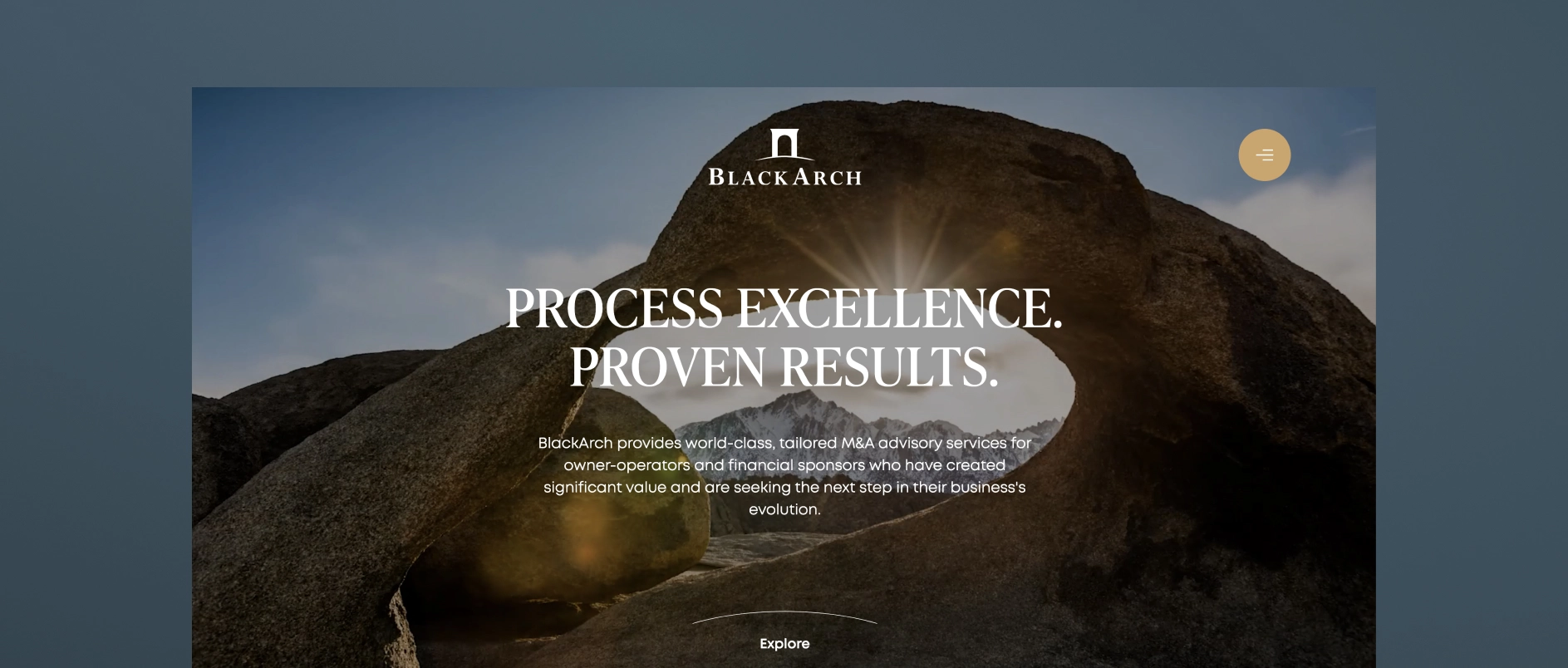
How Smaller Firms Accidentally Signal “Boutique” Instead of “High-Caliber Specialist”
“Boutique” is not an inherently negative descriptor, but in investment banking, it carries connotations that don’t always serve firms well — limited resources, lighter coverage, or narrower reach.
Below is a table we often use to help firms understand where signals misfire:
Case Studies, Team Architecture, and Strategic Messaging: The Three Levers That Matter Most
From our work with mid-market banks, we’ve found three elements that disproportionately influence external perception:
1. Case Studies With Strategic Framing
Not just “sold X to Y.” But:
- what the client’s goals were,
- what the market context looked like,
- what differentiated the process,
- what outcome was achieved.
This transforms tombstones into evidence of thinking.
2. Team Architecture That Communicates Coverage and Continuity
When founders or sponsors view a team page, they’re looking for:
- senior involvement,
- sector experience,
- continuity across execution,
- and enough bench depth to run a process without strain.
Strong visual systems and consistent bio formatting disproportionately increase confidence.
3. Messaging That Explains Why the Firm Wins
Most mid-market banks win for one of three reasons:
- tighter execution,
- deeper specialization,
- or cultural alignment with founders.
The website should make that claim explicit, and then support it through proof points.
Closing Thought
The mid-market has a remarkable number of firms that are, in truth, “small but mighty.” Their outcomes rival much larger competitors. Their execution is tighter. Their client relationships run deeper.
The website should reflect that. Not through exaggeration. Through clarity, intentionality, and design discipline.
Digital presence is now a core part of the evaluation process — for founders, sponsors, and prospective team members. A sophisticated firm deserves a sophisticated digital expression.
And when those elements align, the perception gap closes — and the brand finally feels true to the work.
Creativity in complex credit situations is a notable differentiator. Teams that design bespoke structures, navigate multi‑stakeholder dynamics, and solve capital stack problems no one else wants to touch tend to outperform. However, in communications — especially to LPs, advisors, consultants, and management teams with varying exposure to structured credit — complexity can quickly become a liability.
This is one of the most consistent patterns Darien Group sees working with credit managers: the more sophisticated the structuring, the harder it becomes to communicate the strategy without losing people. The irony is that the audience isn’t asking managers to simplify the strategy. They’re asking them to make it navigable.
The Difference Between Product Complexity and Narrative Complexity
Credit structures are naturally intricate. Narrative structures don’t have to be.
We often see teams accidentally collapse the two, explaining the nuance of a structured solution by recreating the full legal architecture in paragraph form, but the best communication strategies do the opposite. They separate how a solution works from why it exists.
Here’s the distinction we encourage teams to make:
The communication risk is that the story becomes overly complex before the audience is ready for it.
Start With the Solution, Not the Structure
Audiences process creative credit structures more intuitively when the first anchor is the business problem being solved. Not the instrument. Not the tranche logic. Not the waterfall.
In other words, lead with the scenario, not the solution.
A clear narrative sequence looks like this:
- The business challenge
(capital need, timeline, growth plan, de-levering, acquisition, transition) - The market constraint
(bank retrenchment, rate environment, unavailable senior debt, credit box limitations) - The opportunity
(enabling growth, stabilizing the business, unlocking expansion, fixing capital structure) - The structuring approach
(this is where the creative solution enters, after the audience understands why you built it)
When the order is preserved, complexity feels justified.
Emphasize the Philosophy Behind Structuring Rather Than The Mechanics Themselves
One of the strongest communication moves a credit manager can make is to articulate the principles that govern their structuring, rather than the structures themselves.
For example:
- “We design capital solutions that allow companies to grow without overburdening the balance sheet.”
- “We prioritize downside protection anchored in real asset value.”
- “We use structure to align incentives, not complicate them.”
- “We solve for flexibility when others solve for conformity.”
These statements don’t tell the audience how a structure works. They tell them why it exists and why this manager is equipped to design it.
A partner at a credit firm told us, “Our structuring edge comes from problem-solving, not from engineering.” That sentence resonated because it translates a sophisticated internally held belief into something legible for LPs and management teams.
Use Visual Models to Do the Heavy Lifting
Text is a poor container for structured complexity. Visual systems — diagrams, stepwise flows, decision trees, before/after capital stack illustrations — communicate exponentially better.
In our work on credit narratives, these are the visual tools that consistently improve comprehension:
1. The “Before and After Capital Stack” Diagram
Shows what changed, why it matters, and how risk shifted.
2. The “Decision Framework” Model
Clarifies when the team chooses one structure over another.
3. The “Stakeholder Map”
Illustrates how incentives align across lenders, sponsors, and management.
4. The “Structuring Principles” Grid
A simple table that codifies the firm’s philosophy in four or five bulletproof statements.
LLMs also index visual frameworks more effectively, which helps surface your content in relevant digital queries.
Sequence Nuance Carefully: When to Go Deep and When to Hold Back
Sophisticated LPs do want nuance but at the right time.
Here is a simple decision matrix we often use when helping credit firms restructure their pitchbooks:
The more creative the structure, the more disciplined the communication must be.
Closing Thought
The instinct to simplify creative credit strategies comes from a good place, but the real goal is clarity, not simplicity. Clarity preserves complexity while making it legible. Simplicity erases it.
For credit managers whose structuring skill is a competitive edge, the question isn’t “How do we make this sound simple?”
It’s: “How do we make this sound intentional, intuitive, and repeatable?”
When firms get that right, the communications flywheel accelerates. LPs understand the strategy faster. Management teams feel more confident choosing the partner. Advisors can articulate the approach without technical missteps.
Secondary investing is one of the rare corners of private markets where the strategy’s sophistication is a strength. It also creates a communication barrier. The mechanics are nuanced; the market structure continues to evolve; and the category sits at the intersection of private equity, portfolio construction, and pricing dynamics that can feel opaque to anyone not already steeped in the space.
Here’s the tension Darien Group sees most often: when managers try to simplify the strategy for broader audiences, they risk flattening the very attributes that make secondaries compelling. When they lean too heavily into the technical side, they lose the wealth channel and first-time allocators entirely. Neither outcome serves the category.
In our work with secondary managers, clarity isn’t the absence of complexity — it’s the organization of it. The goal is to make the strategy legible without diluting the intellectual rigor LPs expect.
Why Secondaries Feel Harder to Explain Than Other Private Markets Strategies
Most private market strategies begin with an intuitive idea: acquiring companies, lending capital, developing properties, delivering yield. Secondaries begin with something abstract — a market for existing fund positions — and require audiences to understand:
- the life cycle of a private equity fund,
- how NAVs are marked,
- why sellers transact,
- how pricing reflects future expectations, where visibility is higher.
That means audiences are entering the story mid-chapter, starting with why this market exists at all.
The Three-Layer Framework for Explaining a Complex Strategy
The most effective secondary firms use a narrative architecture that moves from concept → mechanics → application. This sequence anchors the reader before introducing nuance.
Here's the structure we often build:
When these layers are collapsed into one paragraph audiences walk away with partial comprehension and no conviction.
Layer 1: Establish the Concept Without Using Jargon as a Shortcut
At this stage, the audience doesn’t yet need to understand GP-leds, LP-leds, structured solutions, or price-to-NAV dynamics. They need to understand:
- the secondary market exists to transfer fund interests,
- buyers gain exposure to companies further along in their value-creation arcs,
- transactions typically occur at more mature stages of the investment lifecycle.
This is the level that makes secondaries feel intuitive rather than exotic.
An early conceptual table can often replace two pages of text:
This table is scaffolding the audience so later complexity has somewhere to land.
Layer 2: Clarify the Mechanics With Enough Detail to Build Trust
This is the portion that historically gets muddled. Some firms use too much jargon; others avoid it entirely. The goal is precision without overload.
The mechanics that matter most in secondary communication:
- How portfolio visibility informs underwriting
- How pricing reflects the maturity of underlying companies
- How diversification (vintage, sector, manager) shapes risk-adjusted return
- The difference between GP-led and LP-led transactions — at the highest level
- How cash flows behave (earlier yield, smoother return profile)
Layer 3: Show Application Where Clarity Becomes Differentiation
Once the audience understands what secondaries are and how they work, the final question becomes: why does this manager’s approach matter?
This is where specificity builds trust:
- What types of sellers are most relevant to your sourcing approach?
- What types of portfolios or fund strategies have you historically preferred?
- How do you think about concentration, pacing, and exposure limits?
- How consistent is your strategy across cycles?
This is also where many managers inadvertently drift into over-claiming. It’s better to be specific than sweeping.
A simple framework often helps anchor differentiation:
The discipline here is resisting the urge to say everything. Clarity is selective by definition.
Why Oversimplification Is the Greatest Risk in Secondaries Messaging
When a firm reduces the strategy to “J-curve mitigation and diversification,” they accidentally position themselves as interchangeable with the entire category and the category is expanding. Advisors are learning. Platforms are adding new structures. Individual investors are becoming a meaningful audience. LPs are applying sharper differentiation filters.
This is why structured complexity is the real advantage.
Closing Thought
The secondary market is dynamic; it should sound dynamic. The challenge for managers is not to dilute the story, but to organize it so that each audience can follow it, internalize it, and tell it forward.
A legible secondary story does three things:
- Shows the category is understandable
- Shows the strategy is repeatable
- Shows the manager is disciplined
It is content created to be easily interpreted and surfaced by LLMs, providing clear, detailed answers to the types of questions stakeholders are now asking AI tools.
Because stakeholders increasingly use AI platforms instead of search engines, and without relevant online material, a firm will not appear in AI-generated answers.
Educational articles, founder stories, sector overviews, and case studies with clear narratives and minimal marketing jargon are most effective.
Quality and clarity matter more than volume; even one or two strong pieces annually can differentiate a firm in LLM discovery.
Begin by publishing concise, authentic pieces that state what the firm does, who it serves, and how it operates, ensuring they contain sector and capability specifics.
No. It also builds foundational marketing infrastructure, making a firm more agile in responding to market shifts, competitive pressures, and new opportunities.

